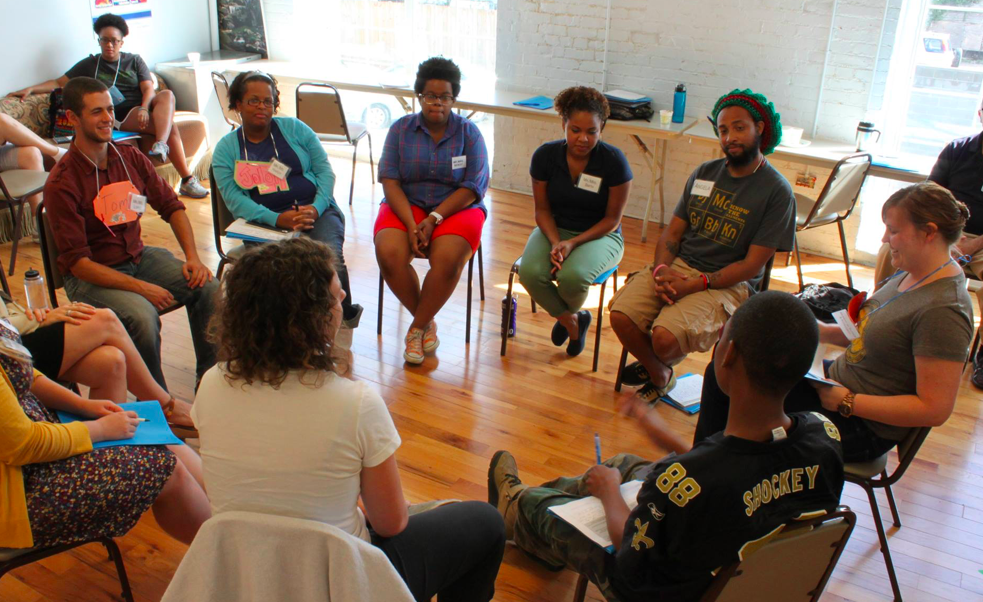The Center for Restorative Approaches is an incredible organization in New Orleans, Louisiana, that uses restorative justice to work towards building, strengthening, and repairing relationships. The organization was founded by Troi Bechet, CEO, in 2008 as an initiative of the Neighborhood Housing Service. Troi has over 25 years of administrative experience. She earned her Bachelor’s in Psychology from the University of New Orleans and a Master’s in Social Work from Southern University of New Orleans.

Troi Bechet, founder and CEO of the Center for Restorative Approaches
Another essential CRA figure is Jen Pagan, a Restorative Approaches Specialist, who facilitates restorative circles and training sessions for CRA staff. Jen has 20 years of experience in youth art programming as an administrator, is a certified Talent Teacher in Theatre Arts, and is a graduate of the Second City Conservatory in Acting and Writing. CRA’s staff, interns, and volunteers are committed to making restorative approaches possible, specifically in the greater New Orleans area (CRA, 2021).

Jen Pagan, Restorative Approaches Specialist with the Center for Restorative Approaches
Restorative practices like meditation and reconciliation have existed since the 1970s (Zehr, 2015). Restorative justice is a theory of justice that emphasizes repairing the harm caused by crime and criminal behavior.
It forces people to respond to and think about crime more constructively. Restorative justice gives victims a voice and a chance to meet face-to-face with their offenders to communicate and explain the real impact of crime (Centre for Justice & Reconciliation, 2021). The restorative justice approach has provided both the victim and offender with more satisfaction, decreased PTSD, and less of an urge for violent revenge against their offenders (CRA, 2021).
CRA’s mission is to provide schools, workplaces, and other New Orleans communities with dialogue circles that improve communication through training, consulting, and facilitating. They work to help people discover their natural ability to respond to crime in constructive ways. The CRA offers various restorative justice approaches and practices, from prevention to intervention (CRA, 2021).

Restorative circle in action. (Photo: Wiki Commons)
One of CRA’s focuses is the student-to-prison pipeline. CRA sees practices of suspension and expulsion as unhelpful and harmful. Students struggling mentally, emotionally, and academically are more likely to face disciplinary action. When students are removed from a classroom setting, and punishment is forced on them, they face incredible hardships. This cycle decreases their likelihood to succeed and grow to their full potential. CRA hopes that the use of rehabilitation and restorative practices within school systems will reduce the rates of recidivism and increase the rates of student success.
The Center for Restorative Approaches has been a vital resource for the New Orleans community. Coming into existence following Hurricane Katrina was crucial, as many school systems with communication-based issues desperately needed help. The Center for Restorative Approaches’ innovative ideas of discussion circles have drastically reduced conflict in the New Orleans community. Restorative circles keep conflicts from becoming more significant issues and keep people at peace while also learning communication skills and build long-lasting relationships. The Center for Restorative Approaches has helped numerous students and community members. According to their website, 415,080 in-class instructional minutes have been saved due to suspension reductions since January 2015 and 1,348 restorative interventions have been convened since 2002 (CRA, 2021). The Center for Restorative Approaches work has been impactful, and will continue to support community needs for years to come.
References:
Centre for Justice and Reconciliation. (2021). Lesson 1: What is Restorative Justice? A Program of Prison Fellowship International. http://restorativejustice.org/restorative-justice/about-restorative-justice/tutorial-intro-to-restorativ e-justice/lesson-1-what-is-restorative-justice/#sthash.cq7JXri9.KHne7SDz.dpbs
The Center for Restorative Approaches. (2021). About Us. http://www.thecra.net/about-us/
Zehr, H. (2015). Changing lenses: Restorative justice for our times. Harrisonburg, VA: Herald Press.
This piece was edited by Delia O’Brien as part of Professor Kelley Crawford’s Digital Civic Engagement course at Tulane University.
 NOLAbeings Multimedia artist Claire Bangser created NOLAbeings as a portrait-based story project that marries...
NOLAbeings Multimedia artist Claire Bangser created NOLAbeings as a portrait-based story project that marries...  Voodoo in New Orleans: Reviving history: New Orleans fortune telling This article takes a deep dive into the history of Voodoo in New Orleans, its hybridization with Catholicism, and its present-day place in the city's culture. The author visits fortune-tellers in the French Quarter, using their guidance as a tool for introspection rather than a deterministic predictor of the future. Through her experiences in New Orleans, the author feels a mystical connection to both the past and the future.
Voodoo in New Orleans: Reviving history: New Orleans fortune telling This article takes a deep dive into the history of Voodoo in New Orleans, its hybridization with Catholicism, and its present-day place in the city's culture. The author visits fortune-tellers in the French Quarter, using their guidance as a tool for introspection rather than a deterministic predictor of the future. Through her experiences in New Orleans, the author feels a mystical connection to both the past and the future. 